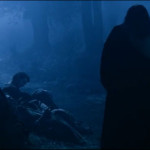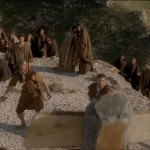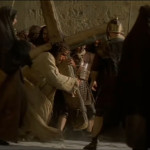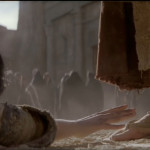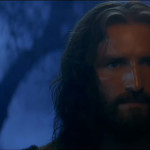Mel Gibson and biblical films have one thing in common, they’re both a major hit or miss situation. Gibson has struggled to make films of the same standard as his 70s and 80s films like Mad Max in the last few decades, and biblical adaptations such as The Last Temptation of the Christ have not always been a good cinematic experience.
The problem arises when the holy triumphs the artistic. And that applies to films of about any sort when there’s little artistic authenticity, and all the focus is sent towards the agenda or the moral message of a film. A more artistic film would never be direct about its message and would question rather than declaring.
Mel Gibson’s The Passion of the Christ is good to look at and is shorter than the usual length of biblical films, but it barely succeeds at having an identity, and the underlying message is as basic enough as the acknowledgment of Satan’s villainy and defeat, something you’d find in every other biblical text or adaptation.
How to Stream or Download The Passion of the Christ
To stream or to download the film, click on the Download button at the end of the review. Then decide which digital store you want to visit. Check out also other films by Mel Gibson, that we have reviewed such as Hacksaw Ridge (2016), The Patriot (2000), or Braveheart (1995).
The Movie Review
The Last Temptation of the Christ is set closer to the events of Jesus Christ’s crucifixion. It begins with an encounter between Jesus and Satan in Gethsemane, where Jesus happens to be praying. Satan appears in a ghost-like form and tries to tempt Jesus.
https://youtu.be/4Aif1qEB_JU
A serpent appears, whose head Jesus ends up smashing, defeating Satan in the encounter. And shortly Jesus is betrayed by one of his own disciples and is arrested and beaten by guards, who then carry him to Sanhedrin. Jesus’ disciple John informs his mother Mary, as well as Mary Magdalene about the situation, while the other disciple Peter trails Jesus and his captors stealthily.
Caiaphas conducts a trial, where several false witnesses and accusations are brought regarding Jesus. This is also where Jesus declares that he’s the son of God, and is then punished to death for committing blasphemy under the law.
Caiaphas then brings Jesus to Pontius Pilate for crucifixion but is interrupted by Pilate’s wife Claudia, who convinces the two of Jesus being a man of God. He is eventually found not guilty, but Pilate gives the public the power to decide. They have to choose who gets freed between Jesus and an actual criminal named Barabbas. The cruelty of the crowd is highlighted by the fact that they demand Barabbas to be freed instead of Jesus.
Then occurs the punishment and the crucifixion of Jesus Christ, during which Satan pops up to have a moment of enjoyment, but after the execution of it, Satan cries out loud in defeat. The in-between of the film is so grounded that you forget the Satan narrative altogether, and he appears not as a metaphorical way of telling the story, but as a way to directly highlight the age-old theme of Satan’s evils and his defeat.
It highlights nothing more than that, no theme of purity vs evil itself is explored. Mel Gibson Benedict Fitzgerald’s script is a little too basic and offers barely anything over all the stories every Christian may have grown up reading.
Gibson’s direction also does not offer anything too good. It’s a middling take with age-old visual storytelling techniques. The film’s direction is extremely bland compared to a near-masterpiece like Martin Scorsese’s The Last Temptation of Christ, even though it’s nothing really terrible.
It’s just something hard to like. And unlike most biblical epics and adaptations, this film doesn’t even feature technical beauty. Caleb Deschanel’s cinematography is forgettable, and John Debney’s music is a little too stereotypically biblical. Jim Caviezel does well in the titular role, but the film rarely allows him to shine.
Interestingly, The Passion of the Christ was released 16 years after the much superior The Last Temptation of Christ. The problem with The Passion of the Christ is that it’s really hard to like besides the fact that it’s a biblical adaptation. It barely offers anything authentic and doesn’t make the best of the artistic medium that filmmaking is.





